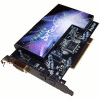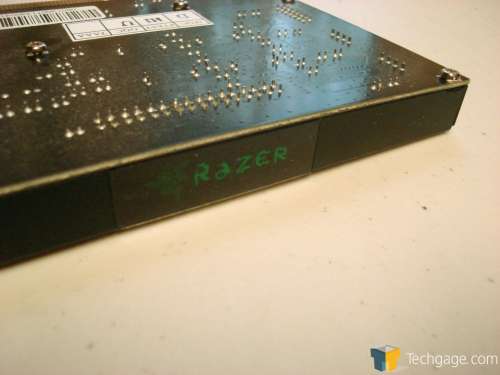- Qualcomm Launches Snapdragon 4 Gen 2 Mobile Platform
- AMD Launches Ryzen PRO 7000 Series Mobile & Desktop Platform
- Intel Launches Sleek Single-Slot Arc Pro A60 Workstation Graphics Card
- NVIDIA Announces Latest Ada Lovelace Additions: GeForce RTX 4060 Ti & RTX 4060
- Maxon Redshift With AMD Radeon GPU Rendering Support Now Available
Razer Barracuda AC-1 Sound Card

With the anticipated release of the Razer Mako loudspeakers, we have a look at Razer’s Barracuda AC-1 audio card, and compare it to two other common audio solutions. The Barracuda AC-1 boasts an impressive feature set, and its audio chipset has an excellent reputation for sound quality. Will it be a fitting partner for the new Mako speakers?
Page 8 – Conclusion
Until recently, Razer hasn’t been known for their audio products; however, they are quite well known for doing their homework when it comes to a new product release. By pairing a high-quality off-the-shelf audio chipset with a robust board design, adding thoughtful features like Toslink optical input/output and HD-DAI, and including an easy-to-configure control panel, Razer has delivered a product that will appeal on multiple levels to their target market: gamers.
My favorite feature of this card is the Toslink output, which makes it easy to connect the Barracuda AC-1 to a multichannel home theater receiver, for a decidedly powerful music and gaming experience. The Dolby Headphone and Dolby Virtual Speaker processing are also particularly helpful, since I don’t typically use my PC with a multichannel audio system for gaming – I prefer to use a pair of stereo headphones, or a pair of stereo loudspeakers, and Dolby Headphone and Dolby Virtual Speaker produce a very convincing surround sound experience.
Even so, this card has a few shortcomings. The first, perhaps, is its price. Retailing for $200, the Barracuda AC-1 doesn’t come cheap. On the one hand, you’ve got to pay to play, and Razer realizes full well that with a sufficiently high-end product, the cost of admission is one of the product’s selling points, as a status symbol. In the other peripheral markets that Razer addresses, they have focused on delivering both a high-end product and a high-end image of the brand, and both those factors help to sell products.
The second shortcoming of this product is that in our loopback testing, the weakness of this product’s analog input stage was revealed, resulting in a higher SNR measurement than I think this product delivers in actual use. The third is the HD-DAI dongle, which I have a love/hate relationship with. On the one hand, the HD-DAI connector provides a quick way to connect and disconnect a multi-channel sound system to the card, but on the other hand, it hangs off the back of the PC like a vestigial tail, and I’ve found that it generally needs to be removed when transporting the PC. And finally, the fact that the C-Media OxygenHD chipset performs its DSP functions in software added measurable overhead to the CPU, though it was nowhere near as bad as an onboard audio solution.
In the end, however, the Barracuda AC-1 is a seriously solid performer, delivering audio that’s crisp and detailed, bass that’s deep, impactful, and remarkably distortion-free, and a plethora of configuration and DSP options to suit any preference or program material. Its feature set alone is enough of a selling point without the fact that the Barracuda AC-1 actually delivers on its marketing promises, and Razer’s meticulous attention to the small details makes this card a joy to use. I can recommend this card without hesitation, particularly if your intended application is gaming. If you’re a golden-eared, ultra-critical listener, you might want to go for the Auzentech X-Meridian, with its upgradeable op-amps, or a Creative X-Fi card, but the Barracuda AC-1 satisfies my ears. And that’s the final judgement.
- Good
- High-quality audio chipset
- Excellent midrange and treble definition
- Virtually no audible distortion
- Solid, well-defined bass
- HD-DAI provides convenient connections
- Industry-standard DSP algorithms
- Excellent control panel
- Bad
- Expensive
- Didn’t take well to certain aspects of testing
- DSP in software increases CPU overhead
If you have a comment you wish to make on this review, feel free to head on into our forums! There is no need to register in order to reply to such threads.

|
|
Support our efforts! With ad revenue at an all-time low for written websites, we're relying more than ever on reader support to help us continue putting so much effort into this type of content. You can support us by becoming a Patron, or by using our Amazon shopping affiliate links listed through our articles. Thanks for your support!





